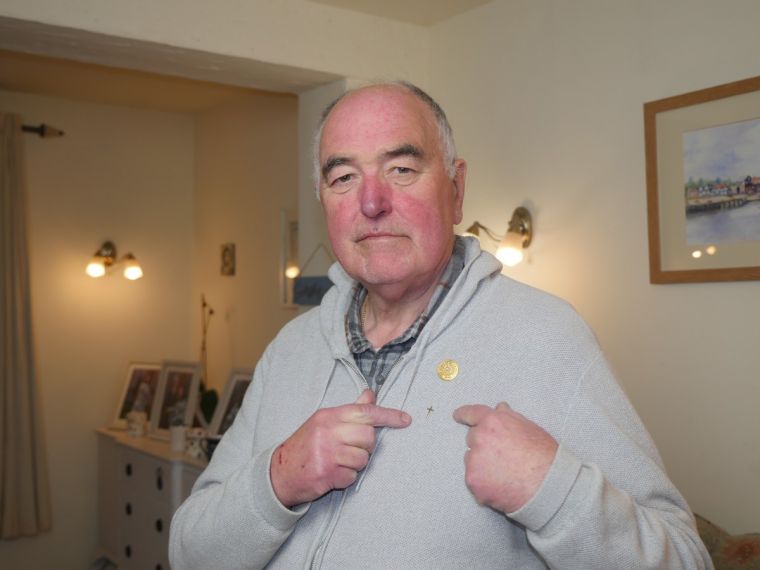Marie Curie apologises to chaplain who was banned from wearing cross

Cancer charity Marie Curie has apologised "unreservedly" after a Christian chaplain was told he could not wear a small cross pin while meeting patients.
Derek Timms, who is being supported by the Christian Legal Centre, has been a Marie Curie chaplain in Solihull for four years during which time he has worn a half-inch cross pin without complaint.
He claims that the Methodist minister in charge of the Solihull chaplains - recently rebranded 'spiritual advisers' by the branch - told him to "refrain" from wearing the cross because it could "create a barrier" and "offend" non-Christian patients.
In an email to Mr Timms, the minister is reported to have said, "The idea is that we should be appear neutral and that enables a spiritual encounter that is about what the person we are visiting needs."
When Mr Timms insisted on wearing the cross as a symbol of his faith and a sign that he is a Christian chaplain, a compromise was offered in which he says he was told he could carry it in his pocket and put it on when visiting Christian patients.
After failing to find any prohibition of religious symbols for chaplains on Marie Curie's website, he objected again and was called to a face-to-face meeting on 20 September.
According to the Christian Legal Centre, Mr Timms was told at the meeting that he would need "re-training" because of his refusal to comply or recognise wrongdoing, and that he should re-consider whether Marie Curie was the "right place" for him.
He says he was then told that unless he removed his cross, he would not be able to work as a Marie Curie chaplain, at which point he handed in his identification badge and left the premises.
When the matter was referred to the Marie Curie regional head office, he received an apology for any distress caused.
It said in its response, "I can confirm that currently we have neither an organisational or uniform policy that would support our recent request to remove your cross while supporting patients and families in the Hospice. I apologise unreservedly for the distress that we have caused."
Mr Timms welcomed the apology but said he was "shocked and hurt" by how he was treated and would be looking for opportunities to serve as a chaplain elsewhere.
"There was and is no need to suppress the symbol of the cross and in so doing send a message that the Christian faith needs to be neutralised or removed entirely from a chaplaincy front line service," he said.
"Interfaith ideology is becoming so firmly embedded throughout the Christian faith that it is essentially cancelling itself."
He continued, "The easiest thing to do would have been to say, 'I'll take it off', but I thought, 'no', I should be standing up for what I believe in.
"If I had given in, I believe I would have been saying that I am embarrassed to be a Christian.
"From experience, by wearing my cross, patients trust me, they might not have my faith or belief, but they trust me. I always meet people 'where they are' whether they are a Muslim or atheist, and it has always been a privilege for me to support people at the toughest moments in their lives.
"I welcome and appreciate the apology from Marie Curie but believe my work as a chaplain now lies elsewhere."
Andrea Williams, chief executive of the Christian Legal Centre, said chaplains should be free to wear Christian symbols.
"Derek is a kind man who is passionate about Jesus and sharing the hope and faith that transformed his life," she said.
"He has never had a single complaint until now for wearing his tiny cross. He showed great courage by refusing to cave into the significant pressure to remove what mattered so much to him.
"Methodist Sunday school teachers were the ones that introduced me to Jesus when I was a little girl. They would be horrified to think that a Methodist minister could say such things to Mr Timms.
"We call on chaplaincy teams and leaders across the UK to not be ashamed of the Christian faith, but to uphold and cherish the crucial role Christian chaplains play in supporting people at the most vulnerable moments in their lives."











